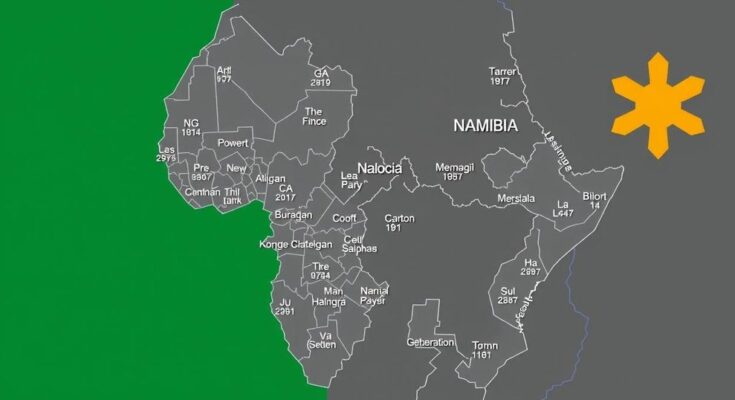Namibia’s upcoming election on Wednesday is a critical challenge for SWAPO, the ruling party since independence in 1990. Economic hardships and a growing youth electorate are reshaping voter sentiments, amidst significant electoral defeats faced by liberation parties in southern Africa. The election could lead to a historical first: either the election of a female president or an opposition victory for the first time in Namibia’s history.
On Wednesday, Namibians are set to participate in an election that poses a significant challenge for the South West Africa People’s Organization (SWAPO), the ruling party since 1990. This electoral event follows a trend across southern Africa in which traditional liberation parties have suffered significant defeats. Major issues such as high unemployment, governance concerns, and a housing crisis have emboldened the populace, leading to a decrease in support for SWAPO.
The recent election outcomes in neighboring countries, including an unprecedented loss of parliamentary majority by the African National Congress in South Africa and the Botswana Democratic Party’s loss of the presidency, underscore the shifting political landscape. Young voters in Namibia are increasingly disillusioned with the promises of liberation movements and are demanding tangible improvements in their socioeconomic conditions. Over 40% of Namibia’s registered voters are under 35, representing a significant electoral force that has the potential to change the political dynamic.
In response, SWAPO has sought to engage youth by enlisting popular South African musicians to attract younger audiences to political rallies. Despite efforts to energize this demographic, the actual influence of youth voters remains uncertain, as they have historically shown lower voting rates compared to their older counterparts. Moreover, Namibia faces dire economic challenges, including a lack of affordable housing and a high unemployment rate, which are fostering public dissatisfaction with the current administration.
The election is characterized by the presence of several opposition candidates, which could split the vote and inadvertently benefit SWAPO. The party’s presidential candidate, Netumbo Nandi-Ndaitwah, stands to become the first female president should she be elected. The outcome remains ambiguous, as no candidate has previously surpassed the 50% threshold needed to avoid a runoff, which would be a historic first for Namibia.
Namibia has encountered numerous challenges since its independence, with the SWAPO party leading governance amidst growing dissatisfaction due to economic hardships, corruption, and inadequate housing. Political analysts suggest that the democratic processes across southern Africa are shifting, as more citizens, especially the youth, become increasingly disillusioned with post-colonial parties. In this context, the upcoming election bears significance, marking a pivotal moment for both SWAPO and the opposition parties amid rising discontent among the electorate.
The forthcoming Namibian election poses a critical test for SWAPO, as both internal and external factors play crucial roles in shaping the electoral outcome. With significant numbers of young voters expressing dissatisfaction with the ruling party, SWAPO must navigate a complex political landscape. The results will not only reflect the public’s current sentiment but could also pave the way for historical changes within Namibian governance, potentially ushering in either the country’s first female president or a new opposition leadership.
Original Source: www.nytimes.com




